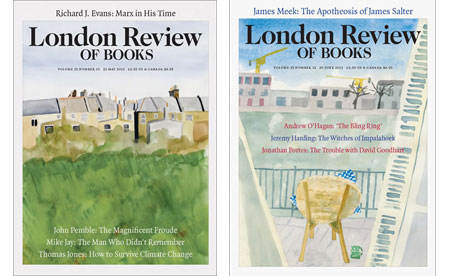
I emailed a nice man at the London Review of Books. My subscription had lapsed and I'd decided, quietly, not to renew.
Was there a reason I wasn't renewing? Well, now that you mention it, yes, there was a reason, absolutely. And since they were asking, I wrote back and told them.
The problem was the game my partner and I played every time a new edition arrived in our letter box. We call it Guess the Ladies. How many this week? I'd ask, trying not to sound jaded.
Four. Reviewers or reviewees? Both. Out of 20. Oh. So now I'm jaded.
You can play along at home if you happen to have a subscription to one of the UK's premier literary review journals. If not, you can review the contents online at your leisure.
Having been asked, I told them: the ridiculously low number of women who are represented in each edition of your otherwise worthy journal is, well, ridiculous. The reply: It's complicated, "as complicated as it gets". The response was genuine in its bafflement and its hand-wringing consternation, and ended by stating that the editors at the LRB were desperate to change the situation.
To which I replied: then change it.
And then I posted the exchange on my blog, where it was retweeted and picked up by Salon.com in the US. Many people responded with, "I've been thinking that for ages." We might be the only household where Guess the Ladies is played, but we're clearly not alone in our frustration with the gender balance of the LRB.
Indeed, the US lobby group for women in the literary arts, Vida, has been doing its own, slightly more statistically exacting version of Guess the Ladies for books coverage across the print media for some years (including the LRB). When the first survey, complete with pie charts, was published in 2011, there was widespread consternation at the striking gender imbalance. Two years later the Guardian looked at gender balance in the books pages, and I'll leave you to guess how little the picture at the Review has changed.
Although there's been no reply to my follow-up emails (no phone calls, no flowers, nothing), an LRB editor, Deborah Friedell, wrote to Salon, explaining, "we're getting better, particularly when it comes to promoting and publishing the next generation of female critics". She noted that the Review already publishes esteemed women writers. What I've lamented is the proportions, which are consistently low, though great for Guess the Ladies.
Indeed, in its latest innings, Guess the Ladies scored 14 male contributors and three female. Of the books reviewed, eight were by men and three were by women. By publishing a literary journal with about 70% male contributors in every edition, the implicit message is that male writing is better than female writing. If you believe this to be the case, have the courage of your convictions and admit it, so that we can acknowledge what the argument really is. If however, you believe that women writers are equal to male writers, then try harder. It isn't complicated. It's simple.
My LRB correspondent explained that "men vastly outnumber women among writers proposing pieces", but then went on to confirm that it is the editors who approach contributors – so, surely, in this case, the complication lies with the editors themselves. Is it more complicated to commission a woman than to commission a man? I want journals like this to succeed. I want to celebrate literature being taken seriously, being given proper space for reflection. However, I don't believe that serious literature is confined to male writers.
The response to my blogpost brings to mind the Arthurian tale of the Fisher King, in which the knight Parsifal rides to an unknown kingdom where he meets a king with a festering leg wound. As the king reclines on a hammock, groaning in agony, the courtiers party around him, all too polite to mention this suppurating sore. So Parsifal, being well brought up, keeps his mouth shut too. At the end of the evening he rides home to his wife who berates him for not caring enough to mention the king's very obvious wound. So Parsifal (who has learned to listen to his wife) trots back to the kingdom and enters the palace. There he is, the king, lying on a hammock, groaning. "You're wounded," Parsifal says, "What ails you?" And his question – his concern – heals not only the king but the entire kingdom.
Silence doesn't help. Pretending that there is no problem doesn't mean that there is no problem. It simply means that a collection of cats have got our tongues. Are we too shy, too scared, too awkward to say: this does not look good, my liege, best get some antiseptic on that?
Deborah Friedell concluded her letter to Salon.com by saying "We're trying; we'll try harder." Great. Try harder sooner, please.

